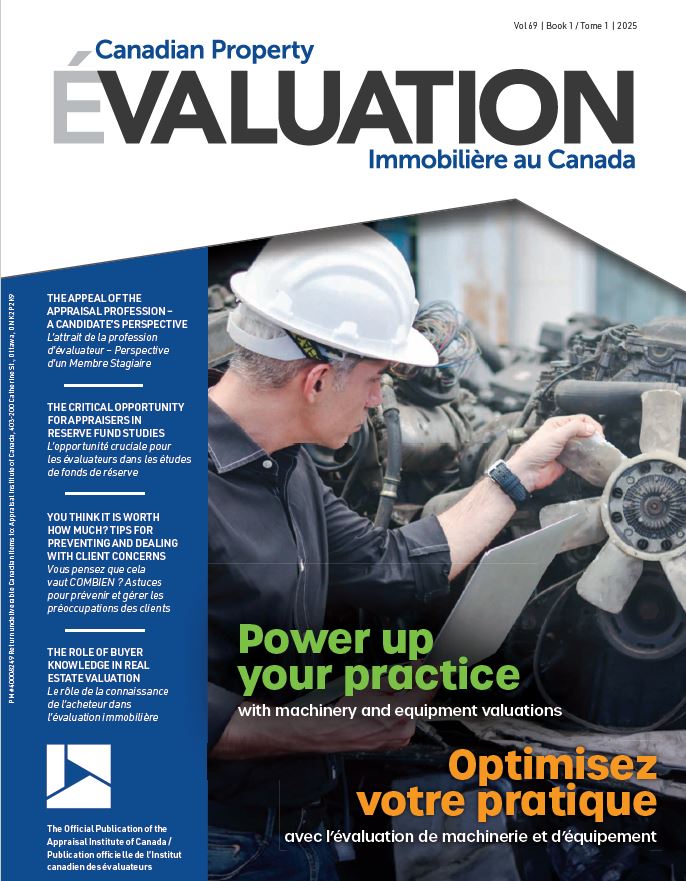The critical opportunity for appraisers in Reserve Fund Studies
Canadian Property Valuation Magazine
Search the Library Online
By Terry Dowle, P. App., AACI, RI, CRP
In the evolving landscape of real estate appraisal, diversification is more crucial than ever. In the 2015 Canadian Property Valuation Magazine (CPV) (Volume 59, Book 4), three authors – Kari Benum, P. App., CRA; Ernie Paustian, P. App., AACI; and Dan Wilson, P. App., AACI, Fellow – penned an article called Understanding Reserve Fund Studies. Their goal was to encourage AIC Professional Appraisers (P. App.) to consider offering Reserve Fund Studies as one of their services. The article emphasized the importance of incorporating Reserve Fund Studies as a vital expansion of their professional practice, recognizing the substantial opportunities this field presents. They concluded: “As AIC Members, there are tremendous opportunities in developing our skill sets in this area and expanding our scope of practice into the reserve fund planning field.”
Almost a decade later, the message remains the same. Despite efforts by the Appraisal Institute of Canada (AIC) to pave the way for our Members to engage in reserve fund planning, diversification has been slow. Yet, the demand for such expertise is only growing. The AIC has made significant strides by revising our governing standards to create a clearer pathway for appraisers to undertake these assignments. Through our partnership with the University of British Columbia (UBC) Sauder School of Business and in collaboration with the Real Estate Institute of Canada (REIC), we have developed the premier educational program in Reserve Fund Planning. This initiative equips AIC Members with the skills and knowledge necessary to excel in this field, offering an invaluable opportunity to diversify their practices.
The AIC has long championed the diversification of our Members’ skill sets. As a national organization, our vision is clear: AIC Professional Appraisers are the trusted experts in real property valuation, advisory, and consulting services in Canada. Reserve Fund Studies and depreciation reports should be at the forefront of our Members’ minds, especially given the current economic climate.
Canada is in the throes of an affordability crisis. The federal government’s Housing Accelerator Fund aims to increase the housing stock, a goal that is likely to result in more strata corporations due to urban densification and rising construction costs. These new developments will inevitably require maintenance and repair funding, creating a growing demand for Reserve Fund Studies. This is a space where AIC Members can – and should – play a critical role.
The real estate market is constantly changing, and appraisers must adapt to remain relevant and competitive. Reserve Fund Studies are an essential tool for condominium corporations and homeowner associations, helping them plan for future repairs and replacements of common elements. By incorporating this knowledge base into their portfolios, appraisers can provide more comprehensive services, unlocking new revenue streams and enhancing their value to clients. In my practice, we have successfully integrated insurance valuation, Reserve Fund Studies, and depreciation reports into a successful independent consulting division. With over 1,500 reports in our portfolio, we are seen as a leader in this field. This diversification creates stability of revenue and provides our staff with a position of importance in the industry.
Traditionally, appraisers have focused on property valuation, market analysis, and investment potential. However, the scope of an appraiser’s expertise can be significantly broadened by incorporating Reserve Fund Studies. These studies involve assessing the condition and estimated lifespan of key building components, including roofs, elevators, heating, ventilation and air conditioning (HVAC) systems, and plumbing. Gaining expertise in this area also opens doors to related valuation assignments, such as capital planning, insurance valuations, and strata wind-up valuation services.
The demand for this expertise is rising, driven by regulatory requirements and increased awareness of the importance of proper reserve fund planning. In many jurisdictions, condominium corporations and homeowner associations are legally required to conduct regular Reserve Fund Studies to ensure they have adequate funds for future repairs.
In a competitive market, differentiation is key. Appraisers who expand into their practice can distinguish themselves by offering a unique and valuable service. By positioning themselves as multi-faceted professionals who offer both property valuations and Reserve Fund Studies, appraisers can build a strong reputation and attract a broader client base.
Moreover, diversifying skill sets provides an opportunity for significant professional growth. Conducting these studies requires a deep understanding of building components, construction methods, and long-term maintenance planning. Expanding their knowledge in these areas enhances appraisers’ credibility and opens new career opportunities with higher earning potential.
Offering Reserve Fund Studies can also help appraisers build long-term client relationships. These studies are typically conducted every few years, providing recurring business and ongoing engagement with condominium boards and property managers. By consistently delivering high-quality studies, appraisers can become trusted advisors, ensuring repeat business and referrals – key elements for sustained success in the real estate industry.
Financially, diversifying into this field is a strategic business decision. These studies often command higher fees than traditional property appraisals due to their complexity and the expertise required. Additionally, as Reserve Fund Studies become a routine part of property management, appraisers can secure recurring contracts, providing a steady income stream and enhancing long-term financial stability.
For appraisers looking to expand their expertise into Reserve Fund Studies, understanding and adhering to the professional standards is crucial. The Reserve Fund Study Standard (Section 14)
of the Canadian Uniform Standards of Professional Appraisal Practice (CUSPAP) is an essential starting point. This standard outlines the procedures for developing and communicating a formal Reserve Fund Study, ensuring that all reports meet the minimum content requirements to be credible and not misleading.
To effectively perform Reserve Fund Studies, appraisers must also comply with the CUSPAP Competency provision, outlined in section 5.10.1. This provision requires that, before accepting an assignment or entering into an agreement to perform any work, the appraiser must properly identify the problem to be addressed and possess the necessary knowledge and experience to complete the assignment competently. This competency is not just about understanding the basics, but involves a comprehensive grasp of the complexities involved in Reserve Fund Planning.
Education is a critical component in building this competency. Courses offered by the UBC Sauder School of Business, such as Continuing Professional Development (CPD) course 891 – Fundamentals of Reserve Fund Planning, and CPD 899 – Reserve Fund Planning Guided Case Study, provide a strong educational foundation. These courses cover the essential theories and practices necessary for Reserve Fund Planning, offering appraisers a solid starting point in their journey toward proficiency in this field.
However, education alone is insufficient. To fully master Reserve Fund Studies, appraisers must engage in mentorship and practical training. Working under the guidance of an experienced Reserve Fund Planner allows aspiring professionals to gain hands-on experience, apply their knowledge in real-world scenarios, and develop the nuanced skills required to perform these studies at a high level.
Mentorship plays a pivotal role in rounding out an appraiser’s competency. Through practical training, appraisers can learn the intricacies of Reserve Fund Studies, from conducting thorough building assessments to understanding the financial implications of long-term maintenance planning. This real-world experience is invaluable, as it equips appraisers with the insights and expertise needed to provide accurate, reliable, and credible Reserve Fund Studies. Upon completing my courses over 13 years ago, my first assignment was the Shangri-La Tower in Vancouver. Comprising two legal strata corporations and a high-end hotel, the task was daunting. To gain my competence, I hired the course instructor to be my onsite teacher. He accompanied myself and my team on the inspection and guided us in our analysis. This firsthand mentorship was invaluable and set my firm on a pathway for success in this industry.
While the path to becoming proficient in Reserve Fund Studies begins with a solid understanding of CUSPAP standards and formal education, it is the combination of mentorship and practical experience that truly sets successful appraisers apart. For those committed to investing the time and effort to build their competency, Reserve Fund Studies offer not only a significant professional opportunity, but also the chance to make a meaningful impact in the real estate industry. For those interested in exploring this opportunity, now is the time. Engage with an AIC Member who is already active in this field, learn from their experience, and consider enrolling in the Reserve Fund Planning Program at UBC. The best time to expand your horizons is now, as more provinces enact legislation around Reserve Fund Planning and government initiatives drive new construction. It is a good time to be an appraiser – and an even better time to diversify.





